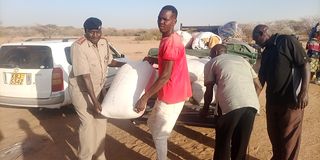Premium
Over 300,000 in need of food aid in Marsabit as drought bites

Mr Abdi Boru shows carcasses of cows that have died due to drought in Dabel village, Marsabit County on August 24, 2022.
The number of Marsabit residents in dire need of food aid is expected to rise to more than 300,000 in January as drought continues to bite in the region.
According to the National Drought Management Authority (NDMA), there are 252,882 residents of Marsabit relying on humanitarian organisations and the government for food assistance.
The number is anticipated to increase by about 50,000 by January 2023.
NDMA Marsabit County Coordinator Henry Mustafa appealed for more contributions from Kenyans, saying that projections indicate that most areas would experience prolonged drought.
“Marsabit County has continued to experience a massive loss of livestock to drought hence exposing more residents to starvation,” Mr Mustafa said.
Red Cross Communication Manager Peter Ondiko noted that the Global Acute Malnutrition (GAM) rate in Marsabit stands at 53 percent, being one of the most alarming in Africa.
Speaking during the distribution of relief food at Sololo on Friday, Equity Regional Manager in Charge of Northern Kenya Said Maalim Hassan noted that many adaptation options are available to avert perennial reliance on food aid.
“We appeal to our communities to have a complete paradigm shift as a way of coping with climate change,” Mr Maalim said.
He called on the region to harvest rain water through dams and have a crop farming culture to ensure sustainable food security.
Mr Maalim observed there was a need for the construction of boreholes in Northern Kenya counties where there were swathes of arable land lying fallow.
He added that there was also a need for integration of climate-related training in the education system to get the right human capital in the region.
The National Drought Response Committee gave food hampers to 2,860 households in the Moyale Sub-county.
Over 85,000 Kenyans from the five counties of Samburu, Meru, Marsabit, Kilifi, and Kitui are expected to benefit from the Drought Response Committee food hampers.
The committee is also expected to distribute the food hampers dubbed “Wakenya Tulindane” to 14,000 households across Kenya.
The Drought Response Taskforce announced that over Sh600 million had been raised so far in a joint effort to support Kenyans impacted by the ravaging drought.
Isiolo appeal
Meanwhile, hunger-stricken families in Sericho, Isiolo South constituency, have appealed for food aid from the government as drought continues to wreak havoc in the region.
The prolonged drought has resulted in drying of over 80 percent of water sources and drying of pastures, thus exposing more than 150, 000 residents in the county to hunger. Additionally, the meteorological department has already warned that the March-April-May rains may be suppressed.
“We are unable to provide for our families because pastoralism has been dealt a huge blow by the drought. We appeal for human food, livestock feed and drugs,” a resident, Ms Aisha Osman, said.
Another resident, Mr Mohammed Adan, said drought had caused a drastic drop in milk production in their animals, thus affected the health of their children.
“Many of the children are malnourished because they hardly eat and get milk because the animals are weak,” he said, while asking the county government to provide supplements to the affected children.
Bungoma chief warms hearts in Turkana

Misikhu Location Chief Paul Kisuya is assisted by a resident of Natapeno village in Turkana County to offload relief food on January 1, 2023.
Meanwhile, in Turkana County, a chief from Bungoma County on Sunday warmed hearts of hunger-stricken residents of Natapeno village, Turkana County, after travelling 450 kilometres to donate relief food, shoes, clothes and blankets.
Mr Paul Kisuya, who hails from Misikhu Location, said that he heeded an appeal from President William Ruto and his Deputy President Rigathi Gachagua to contribute food to starving fellow citizens.
"Through our usual barazas, locals in my area agreed to support this initiative to distribute maize, rice, sugarcane, bananas, beans and sweet potatoes to our fellow Kenyans. Being a festive season, we also mobilised for blankets, clothes and shoes," Mr Kisuya said, adding that it was his first time in to Turkana.
Additional report by Waweru Wairimu and Sammy Lutta







